a spones essay that I wrote.
So, I had this idea around a week ago for a writing project - since I've been getting back into TOS in a big way in the past couple of months, that I'd do an essay of sorts about Spock/McCoy, and my perspective on why it's such a great pairing. And today I finally finished it! And even though I figured posting it here would be preaching to the converted, LOL, who else would better appreciate it? ;D So here it is, if you're interested. Insights, fangirl ramble, highlights from a handful of episodes and moments from the films, and some screencaps. (A few have hovering captions.) Hope you like it. :D All opinions and viewpoints are my own.
+++
"Thou and I are too wise to woo peaceably." William Shakespeare, from Much Ado About Nothing; Act V, Scene II. This one line is my favorite way - and the most accurate way - to describe the Spock/McCoy ship and what makes it so special and so great. I didn't do this on purpose, but it's very befitting to me, seeing as how Shakespeare has always been a strong theme in Star Trek. Several episode titles come from lines of his dialogue, and some of the plays themselves are occasionally referenced throughout the show and the films.
Spock and Dr. McCoy are the Beatrice and Benedick, the Elizabeth and Mr. Darcy (Pride & Prejudice in the 23rd century, as I'm also fond of saying), the Tracy and Hepburn of Star Trek. Their banter, their chemistry, and that friction is just what makes their relationship what it is, and it wouldn't be nearly as interesting or enjoyable without it. It makes both characters more exciting to watch, and the story more fun whenever they're in a scene together, waiting to see what they'll do and say to each other next.
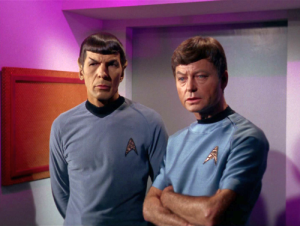
Some of the best romcoms over the years have done this, and the ones amongst my favorites are so because what they focus on is creating lots of bickering and tension between the two main characters. Because they argue, because they snark at each other, we want badly for them to get together. It's been such a staple in storytelling for so long. Why? Why do we enjoy it so much? Well, I think the answer is simple.
Anticipation! It's the build-up, the escalation of the tension - it's like a volcano, and eventually it must be released! My favorite romcom of all time, The Cutting Edge, offers up a great explanation for this: "We never get along, we're always fighting." "Foreplay!"
And in my opinion, that's exactly what it is, and why we like tension-filled chemistry so much. Because it's like the two characters are having sex with words. They can't have sex, or otherwise show how they really feel, so they have to bicker and banter with one another. It's how they get that same feeling, that same thrill, from the relationship.
Spock and McCoy are the poster boys for this, whether you ship them or not. Because if you don't, it's simply how they show their friendship. But if you do, it's how you know they really just want to get it on already.
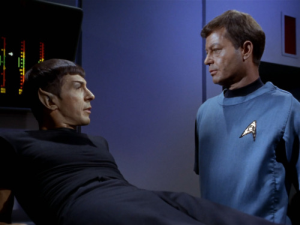
"Your pulse is 242. Your blood pressure is practically nonexistent, assuming you call that green stuff in your veins blood."
"The readings are perfectly normal for me, Doctor. Thank you. And as for my anatomy being different from yours, I am delighted."
- 1.04, "The Naked Time"
They really don't waste any time. From the very beginning, from one of the first episodes of the series, it's already there, that snarky chemistry between them. Now, the mission didn't start at the same time the series did, so obviously the characters' relationships with one another are already established to a point, but the fact that the nature of Spock and McCoy's relationship was nailed down that early in the series is pretty great to me. It's the smarmy thing McCoy says to him, and the sassface Spock replies with. All the components are clearly there from the get-go, and the writers took such delicious advantage of this as time steadily went on...
Scotty: You said a while ago that there were always alternatives.
Spock: Did l? I may have been mistaken.
McCoy: Well, at least I lived long enough to hear that.
- 1.16, "The Galileo Seven"
McCoy: Spock, you're the most coldblooded man I've ever known.
Spock: Why, thank you, Doctor.
- 1.20, "Court Martial"
While it's true that they can really cut into each at times (which I'll get to a little later), there are, of course, plenty of examples of their superficial teasing of each other, as well. They're both very smart, very witty people, and they never miss a chance to take a poke at each other. What I enjoy is that the writing kept it varied - sometimes Spock would zing McCoy, sometimes McCoy would zing Spock, sometimes it was facetious, sometimes it was serious. It assured that their relationship wasn't just something to only be played for laughs or only to be seen in earnest; the show gave us the proper layers to it.
The final episode of season one, "Operation: Annihilate!", is one of the handful of episodes (and one of the first) where we get to see all parts of this in action. When Spock is seriously injured by an alien creature, McCoy - being the doctor and friend that he is - is pretty adamant about hovering over him and making sure that he's all right. And when an experiment to exterminate the aliens blinds Spock (temporarily), McCoy's regret over this is quite palpable - he takes all the responsibilty for what happened and never tries to defend himself; his sole concern is for Spock. And then, when Spock recovers, the episode couldn't end better:

McCoy: Unusual eye arrangement. I might've known he'd turn up with something like that.
Kirk: What?
McCoy: I said, please don't tell Spock I said he was the best first officer in the fleet.
Spock: Why, thank you, Dr. McCoy.
Kirk: You've been so concerned about his Vulcan eyes, Doctor. You forgot about his Vulcan ears.
The way Spock looks at him at the end of this exchange is absolutely priceless. His eyes are borderline playful, and he downright smiles. In his own Vulcan way, of course, but there's no denying it's there.
They do get these subtle flirtatious moments throughout the series. I mean, perhaps the writers didn't intend them that way at the time, but when you watch them now, it's hard to see it as anything else. "Operation: Annihilate!" is easily one of them; an exchange between them at the beginning of 1.18, "Arena" is also extremely compelling.
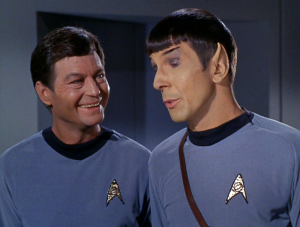
Spock: Doctor, you are a sensualist.
McCoy: You bet your pointed ears I am.
The way McCoy says it, the glint in his eyes when he looks at Spock, and the way he smiles at him are all so flirtatious that I nearly can't believe they got away with it. (There's also a moment later on, when the crew is watching Kirk fight the Gorn, that McCoy tries to make a grab for Spock's hand. You almost don't even notice it, but there's no doubt about what he's doing.)
They can be equal parts catty with and fond of each other, and ultimately I think that's why it works between them. It balances out their relationship as much as their personalities themselves balance each other out, and that's why the two of them together are great to watch.
So often it's the "opposites attract" explanation that is given as the basis for Spock/McCoy and their chemistry. Obviously that is very much true in a number of ways - Spock, who is the stoic, calm, and logical personality; then McCoy, who is the fervent, emotional, and brash personality. A lot of their snarky scenes together come from the fact that they're coming from two opposing viewpoints. But I think it should also be clear that they're a lot alike, as well. They're both intelligent, witty, and stubborn; they're both scientists, and they both possess a strong sense of loyalty. At the end of the day, even if they don't agree, they respect one another's values, insight, and tenacity.

"Please, Spock, do me a favor, and don't say it's fascinating."
"No. But it is... interesting."
- 2.24, "The Ultimate Computer"
As time goes on, it becomes such a natural flow between them, the give-and-take of their chemistry. And in fact, other moments besides the usual trading of barbs begin to coalesce. One of the things about their relationship that I've always liked is the fact that, a number of times, Spock comes to McCoy when he is need of aid or to ask for his advice. (Namely, 2.13, "Obsession" and 1.13, "The Conscience of the King.") This, I think, stands as strong proof of what lies under their usual banter and reveals something very positive about their relationship.
Despite the fact that Spock has made several sarcastic remarks at the doctor's expense, making negative comments about humans and about McCoy's medical capabilities, he still seeks McCoy out - as a colleague, an equal, a friend - to be his sounding board and to confide in. Because underneath all of their bickering, McCoy is still someone that Spock deeply trusts and whose expertise he holds in a high regard.
On McCoy's end, it's clear he's very protective of Spock. As a doctor, he would obviously be attentive towards others, but in 2.23, "The Omega Glory," when the planet's inhabitants accuse Spock of having no heart (because in Vulcan anatomy it's not located in the same place), it's McCoy who is fast to jump to his defense to explain - when he himself has always teased Spock about the same thing. And even though he'll berate Spock's stoicism, in 2.10, "Journey To Babel," it's clear he respects the Vulcans, otherwise he wouldn't ask Spock how to properly greet the planet's ambassador.
If you'll also notice, several times throughout the series, when Spock and McCoy are having an argument and trading quips with each other, and Kirk is part of the conversation, he'll oftentimes watch them with amusement as they go at each other. And it's always a knowing smile he wears, which makes it clear that Kirk gets a kick out of their banter, as well. Almost makes you feel like he's thinking the same thing we are.
An episode I think that reveals a crucial moment between them is in 2.25, "Bread & Circuses." Captive on a Romanesque planet, first Spock gets snippy at McCoy for talking about logic - something that always amuses me, because he's always critical of McCoy's emotionalism, so you'd think he'd be pleased by the doctor's use of logic. And yet! (My instinct is always to believe that Spock prefers McCoy to be McCoy, because that's who he depends on.) Then, later - and this is the big one - after Spock saves him from being killed, they share one of their most memorable moments of the series.
McCoy: What I'm trying to say is, you saved my life in the arena.
Spock: Yes, that's quite true.
McCoy: I'm trying to thank you, you pointed-eared hobgoblin!
Spock: Oh, yes. You humans have that emotional need to express gratitude. You're welcome, I believe, is the correct response. However, Doctor, you must remember I am entirely motivated by logic. The loss of our ship's surgeon, whatever I think of his skill, would mean a reduction in the efficiency of the Enterprise --
McCoy: Do you know why you're not afraid to die, Spock? You're more afraid of living. Each day you stay alive is just one more day you might slip and let your human half peek out. That's it, isn't it? Insecurity. Why, you wouldn't know what to do with a genuine, warm, decent feeling.
Spock: Really, Doctor?
I feel like this scene is so momentous because, for one of the first times, we really get an insight into how McCoy thinks of and feels about Spock. Not simply by what he says, but by the meaning that's underneath it. At the beginning of the scene, he's very cordial towards Spock, extending a friendly olive branch to him, and when Spock responds with the same old logic, McCoy reacts intensely. It's a powerful scene, and to watch McCoy's mood completely flip is curious. And I think it's proof of something rather telling.

It's in McCoy's nature to want to be comforting, in my opinion. He's a doctor, he would obviously feel an urge to nurture. He knows Spock as this person who is stoic, always in control, never shows any vulnerability, and I think it gnaws at him. As if he wants to be needed by Spock, have the chance to see his underbelly, but Spock never gives him the chance. In that moment, McCoy was reaching out to him, hoping for a heart-to-heart, and he lashes out at Spock because he was hurt not to get it. It reveals something about him - that he wants to be closer to Spock.
An earlier episode - my personal favorite - 2.18, "The Immunity Syndrome," is also fraught with an emotional tension between them. Stung by Spock being picked over him to study a spatial amoeba, McCoy has a great scene with him before he leaves, when Spock asks him to wish him luck. It's a professional tension that manifests itself in a personal way, especially later when Spock doesn't think they can escape in time and McCoy refuses to allow him to be left behind, even barking out orders before Captain Kirk can.
Their delightful bantery moments always stay intact, though - at the beginning of 2.08, "I, Mudd," another argument about logic - and it's interesting to note how McCoy tries to make amends for his comments when things go south, rather than become snarky. (As well as the fact that they're already together before the scene even starts; a possible suggestion that they do spend friendly time together outside of work.) And 2.11, "Friday's Child," is truly something to behold - when a woman holds McCoy's hand, he immediately yanks it away when he notices Spock is staring at them. It's really kind of amazing as to what this seems to suggest.
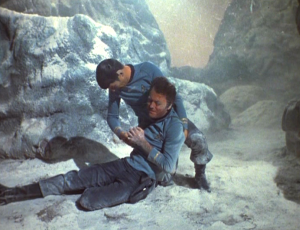
"Leave me here, Spock."
"We go together or not at all."
"Don't be a fool! My hands and face are frostbitten. I can't feel my feet. Alone you have a chance. Now do what I say. Go try to find Jim."
"We go together."
- 3.23, "All Our Yesterdays"
The penultimate episode of the final season is quite a highlight for Spock/McCoy. The episode's story is kind of disappointing and weak, but that aside, what it gives us as far as Spock and McCoy interaction goes is quite good, and enlightening. It starts out with the two of them getting stranded together during a planet's ice age, including the great exchange I quoted above.
There's a lot of touching, and I mean lots of it. When McCoy trips and falls in the snow, Spock doesn't just help him up, but holds him and carries him with a great deal of affection. When being back in prehistoric times begins to affect Spock's emotional state, he tussles with McCoy - and while the doctor is the one being accosted, he doesn't let go of Spock, either.
And in this episode there's evidence of something significant. When Spock's logic and stoicism begins to fail him, and he displays flashes of emotion... This upsets McCoy. The things you most tease your friends and family about are the things that really make them who they are, and you don't truly want that to change, because then they'd cease to be the person you know and love. Despite all the times McCoy snarks about Spock's lack of emotion, when he's faced with Spock's logic not being there, he doesn't like it at all. And he's worried about what's wrong with him.
A similiar, more brief occurrence takes place in 3.05, "Is There In Truth No Beauty?" - when Spock mindlinks with the ambassador Kollos and greets everyone in a cheerful voice, McCoy is taken quite aback. Then when Spock becomes calm again, the doctor smiles with relief.
Over time it's great to see some of these deeper layers of their relationship. In 3.09, "The Tholian Web," there's an emotional tension between them that makes for some compelling drama, as they fight against the clock to safeguard the ship and rescue a marooned Captain Kirk. It's especially good because it's seeing them having to work together, under the gun, and having to overcome their clashing egos.
McCoy: Must be this space is getting to me, too. I know it's nothing you've done, Spock. I-- I'm sorry.
Spock: I understand, Doctor. I'm sure the captain would simply have said, "Forget it, Bones."
A really rather... tender moment occurs between them in 3.12, "The Empath." Prisoners on a doomed planet, McCoy is tortured near to death, and when Spock holds him as he coughs and gasps for air, McCoy looks up at the other man and whispers, "You've got a good beside manner, Spock." Cut to Spock's reaction, and it's clear he's visibly moved by this. For a brief moment, both their barriers are down, and some vulnerability comes through.
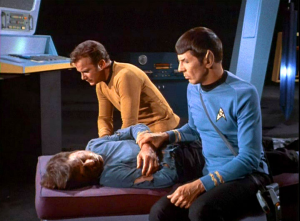
At the heart of it all, despite the effect of Spock's stoicism on their relationship, their earnest displays of emotion will never be scorned or dismissed, but always taken seriously. Despite their bickering, they still know what is important, and such moments always ring true.
Across all three seasons, and numerous episodes, there's never really a dull moment between Spock and McCoy. Whenever they share a scene, it doesn't end without good banter or a meaningful exchange - showing their relationship's multiple facets and that it's defined by all of them. They're good together, and good for each other, because they serve as a good balance for one another. The TV series operates under a trio dynamic - the main character and his two sidekicks. Because Captain Kirk, as the main character, is generally the focal point, to show that the two sidekick characters have a relationship outside of the main character is also important, to give them more layers in their own right. And Spock and McCoy are truly well defined, and great characters.
That isn't to say they're totally perfect - just like anyone else, they have their flaws, and to give them those is also important. Sometimes Spock can be rather sanctimonious, and occasionally McCoy can be kind of tactless. And as a result, sometimes their arguments aren't always fun - but can be kind of heated. However, they know each other well, and their esteem for one another can always see it through.
As I said before, despite their oil-and-water viewpoints, they still have a number of things in common; their mutual stubbornness makes them both incredibly dedicated to their work, and their mutual loyalty makes them both willing to endure whatever they have to for people they care about. They've saved each other's lives on several occasions. Constantly working shoulder-to-shoulder like they do inevitably develops a friendship, and Spock and McCoy certainly have a strong bond.
And of course, as we all know, it got even stronger.
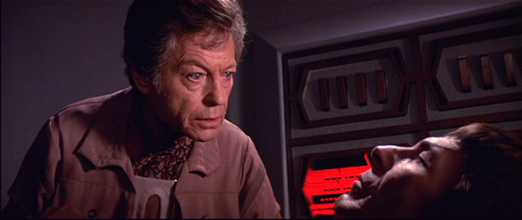
"I'm gonna tell you something that I never thought I'd ever hear myself say. But it seems I've... missed you. I don't know if I could stand to lose you again."
- Star Trek III: The Search For Spock
It really can't be any clearer than that. ;)
The shift in their dynamic between the show and the movies is perpetual source of intrigue for me. I think there's a few reasons responsible for this. A couple of years have passed between the end of the original mission and the events of the first movie; by his own admission McCoy is happy to see Spock again, and that makes sense, after not having seen a good friend for a long amount of time.
By the second film, things are about the same as we've always known them - down to a T, in fact. During a scene whilst Kirk, Spock, and McCoy are discussing the Genesis project, the doctor is his usual self, arguing with Spock and in quite a cranky mood. (Although it does amuse me slightly that he calls Spock 'my logical friend.') And Spock as well reacts in his high-minded manner, so it's both still very much like the old days.
However, the thing that happens next, of course, is the thing that changes everything - Spock's death.
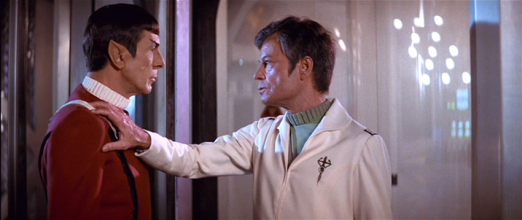
Like he always has done, McCoy tries to stop Spock from sacrificing himself - actually blocking his way into the radiation chamber and pulling him back when Spock tries to sidestep him. Although the attempts to stop him are ultimately in vain, McCoy is still instrumental in ultimately saving Spock's life, for one very well-known reason.
Choosing McCoy to entrust his katra to is a moment in Trek canon that I reflect on a lot. On the surface, I feel that he was the most convenient choice - for Spock as well as for the screenwriters - simply because he was there. But within the confines of the story, it does further illustrate the depths of their relationship, because Spock is trusting McCoy with the absolute utmost thing you can trust someone with - your very soul. Despite the fact that he did have options (Scotty was also there at the time), he chose McCoy, and it's an immense show of faith in him, as well as, quite frankly, a certain level of comfort.
Leaving his soul in McCoy's care is almost like power of attorney. In his death, Spock is trusting McCoy to make those necessary decisions for what happens to him. Which is, in essence, what we see in Star Trek III: The Search For Spock. Realizing what has happened, Kirk goes to McCoy to help both of his best friends, so that they may do what needs to be done with Spock's katra. And this is what happens - when they finally reach Vulcan with Spock's regenerated body, high priestess T'Lar explains the fal-tor-pan process and asks McCoy his decision in what course of action to take. Of course, he chooses to go through with it, but it's the fact that he's consulted, not ordered, that shows the significance of the trust that Spock put in him.
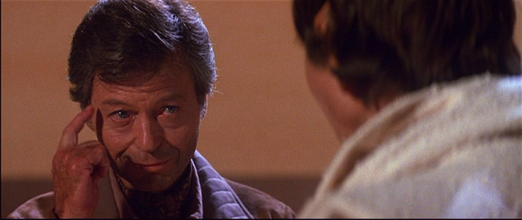
The above quote happens right before this, and it's undeniably a very touching moment. I think, in that one line from McCoy, his entire relationship with Spock is defined. (No matter how you choose to view it, shippy or platonic.)
If the third film is a transition; from Spock's death to his resurrection, it's Star Trek IV: The Voyage Home that completes it. The storyarc as well as the change in dynamic between him and McCoy. It's a downright joy to watch them interact in the film, because every single scene they have together is sheer perfection. Their classic wit isn't haughty, but charming.
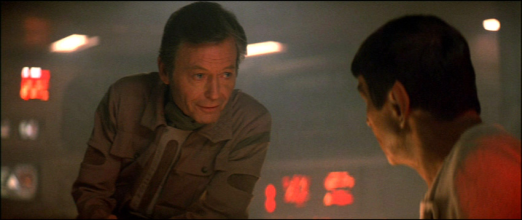
McCoy: ... So what's your problem?
Spock: Acceleration is no longer a constant.
McCoy: Well, you're going to have to take your best shot.
Spock: Best shot?
McCoy: Guess, Spock. Your best guess.
Spock: Guessing is not in my nature, Doctor.
McCoy: Well, nobody's perfect.
There's two things that McCoy does a great deal during the film - a) he hovers over Spock quite a bit; following him around, sticking close to him, and b) he smiles at Spock an awful lot. It's almost ridiculous how often he just stands there and beams at him. In the exchange I quoted above, especially, McCoy doesn't stop grinning at him the whole time. Perhaps he's being snarky, like always, but there's this sense that it's more than that, because McCoy just seems so damn happy. He missed Spock, and he's glad to have him back.
Thus wraps the functioning trilogy that II, III, and IV makes. And then, of course, there's Star Trek V: The Final Frontier next in line. Although it's the one we never like to talk about, similiar the episode "All Our Yesterdays," it's a weak story with the upside being that there are some good Spock/McCoy moments. Their chemistry is as good as ever.
McCoy: It's a song, you green-blooded Vulcan. You sing it. The words aren't important. What's important is that you have a good time singing it.
Spock: I am sorry, Doctor. Were we having a good time?
McCoy: I liked him better before he died.
Another good moment for them comes later, when Kirk is angry with Spock for not killing Sybok, and not telling them that Sybok is his brother, it's McCoy who is quick to come to Spock's defense, and throughout the film, is pretty supportive of what he's going though. And later still, when Sybok makes McCoy relive his pain, and the doctor is close to joining him, it's seeing Spock's refusal to do the same that stops him: "I guess you'd better count me out, too."
You wouldn't expect anything else of McCoy, honestly, but for him to argue with Kirk, yet consistently be on Spock's side, is still rather interesting. (This is not to speak ill of the great friendship that Kirk and McCoy have always had, but simply to point out how Spock so clearly inspires him into action.) A certain softening of the edges has taken place over time, which is great to see.
And then we reach the swan song, Star Trek VI: The Undiscovered Country, with the story reflecting the passage of time, as the crew is coming up on their retirement. Clearly it's an allegory for the actors, crew and fans - knowing it was the original cast's final film together, their final voyage. Spock and McCoy's interaction in it is minimal, but what they get is tried and true.

Spock: Doctor, would you care to assist me in performing surgery on a torpedo?
McCoy: (with a grin) Fascinating.
I love this. McCoy echoes Spock's favorite expression at him, and can't help but smile. And like a well-oiled machine, they assemble the torpedo together. You nearly can't imagine this whole exchange to go so smoothly years ago during an episode of the show, but here now, it does, and not only that, but feels completely natural and makes perfect sense.
This is what I meant by the shift in their chemistry throughout the course of the films, and the passage of time being a reason for it. Both characters go through changes over time, which is to be expected, obviously. It's good that that happens, because in the duration of telling a story, that's what's supposed to happen. This is also reflected in characters' relationships to one another; Spock and McCoy still and will always banter with and snark at each other, because it's so much a part of who they are and how they express their relationship. But over time, some of those more spiteful moments towards one another smooth out, and their mutual fondness shines through.
And as we say farewell, there Spock and McCoy are, on the Bridge, standing side-by-side. As they always have been.
Together, Leonard Nimoy and DeForest Kelley had some of the best onscreen chemistry that I've seen. They understood their characters so well, were such talented actors, and really good friends, and that's how they made that relationship between Spock and McCoy so memorable. I'm in constant admiration of them both, because in the 25 years that Leonard and De played those characters together, it was always pure gold, pure magic, between them. And it wouldn't have been nearly as good without them.
However, now that Star Trek has gotten a reboot, we have a new pair of actors who are attempting to change that.
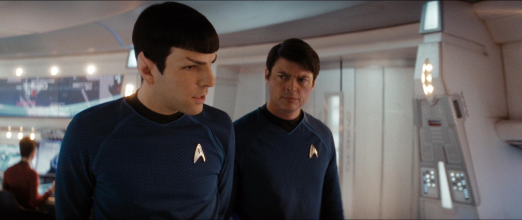
"I intend to assist in the effort to reestablish communication with Starfleet. However, if crew morale is better served by my roaming the halls weeping, I will gladly defer to your medical expertise. Excuse me."
"Green-blooded hobgoblin..."
- Star Trek (2009)
Because the writers at the helm know their Star Trek, the reboot movie doesn't neglect to keep alive many of the most popular parts of fandom - including Spock and McCoy's classic interaction. It's always a source of rich entertainment, and I was glad to see that the filmmakers were diligent at making sure it was there. We get a couple of good scenes - a tongue-in-cheek moment when, after the trial scene, McCoy says, "I don't know [who Spock is], but I like him." And I can only chuckle knowingly.
The other is the one I quoted (in part) above; this tense scene between them is pretty spot-on to being the classic Spock-and-McCoy snarkiness we know so well, and there's definite promise there for subsequent films. The seed has been planted, and time will tell if the relationship as we have known it blossoms again. Zachary Quinto and Karl Urban have a lot to live up to, there's no doubt about it, but they're two very gifted actors who have a grip on who these characters are. They have some good potential to follow Leonard and De's footsteps, and hopefully the future will be ripe with more opportunities.
It's the one thing you can always count on, really. Death, taxes, and Spock/McCoy banter. There's no not taking advantage of it, because it's such a big part of who they are. And it's fun, which is why it will always get used. And why it always has. That spark between them is why their relationship works.
Spock and McCoy make a great duo because they have a certain yin and yang quality to them. They are opposing forces, but they are not in opposition to one another - because deep down they're alike in a number of ways and share a mutual affection and respect. They are complementary, and interdependent - because having Spock around makes McCoy a more interesting character, and vice versa. They're better together than they are apart.
Night cannot exist without day, ergo yin cannot exist without yang. They are opposing, but need each other in order to exist. If there was no McCoy, who would keep Spock honest? If there was no Spock, who would keep McCoy grounded?
They need each other, and they know they need each other.
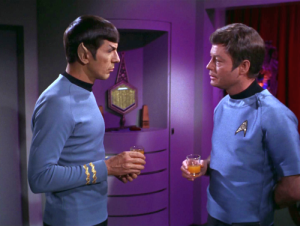
And with all of this to consider, every word I've written so far, the reasons to ship them pile up as high as a mountain. When you boil it all down, at the crux of it all is their chemistry. That it's so stimulating and amusing and charming and witty and magnetic. Complete with much earnesty, fondness, and honesty layered within it to create something truly wonderful. Truly amongst the absolute best to behold.
"Thou and I are too wise to woo peaceably." Because Spock and McCoy are two clever people that take relish in the pursuit, characters who savor a good battle of the wits, and find that so abundant in each other. The way they banter with, confide in, support, and enjoy one another is what makes them such a timeless, inimitable pair.
Benedick: A miracle! Here's our own hands against our hearts! Come, I will have thee; but, by this light, I take thee for pity.
Beatrice: I would not deny you; but, by this good day, I yield upon great persuasion; and partly to save your life, for I was told you were in a consumption.
Benedick: Peace; I will stop your mouth.
- Much Ado About Nothing; Act V, Scene III
+++
"Thou and I are too wise to woo peaceably." William Shakespeare, from Much Ado About Nothing; Act V, Scene II. This one line is my favorite way - and the most accurate way - to describe the Spock/McCoy ship and what makes it so special and so great. I didn't do this on purpose, but it's very befitting to me, seeing as how Shakespeare has always been a strong theme in Star Trek. Several episode titles come from lines of his dialogue, and some of the plays themselves are occasionally referenced throughout the show and the films.
Spock and Dr. McCoy are the Beatrice and Benedick, the Elizabeth and Mr. Darcy (Pride & Prejudice in the 23rd century, as I'm also fond of saying), the Tracy and Hepburn of Star Trek. Their banter, their chemistry, and that friction is just what makes their relationship what it is, and it wouldn't be nearly as interesting or enjoyable without it. It makes both characters more exciting to watch, and the story more fun whenever they're in a scene together, waiting to see what they'll do and say to each other next.

Some of the best romcoms over the years have done this, and the ones amongst my favorites are so because what they focus on is creating lots of bickering and tension between the two main characters. Because they argue, because they snark at each other, we want badly for them to get together. It's been such a staple in storytelling for so long. Why? Why do we enjoy it so much? Well, I think the answer is simple.
Anticipation! It's the build-up, the escalation of the tension - it's like a volcano, and eventually it must be released! My favorite romcom of all time, The Cutting Edge, offers up a great explanation for this: "We never get along, we're always fighting." "Foreplay!"
And in my opinion, that's exactly what it is, and why we like tension-filled chemistry so much. Because it's like the two characters are having sex with words. They can't have sex, or otherwise show how they really feel, so they have to bicker and banter with one another. It's how they get that same feeling, that same thrill, from the relationship.
Spock and McCoy are the poster boys for this, whether you ship them or not. Because if you don't, it's simply how they show their friendship. But if you do, it's how you know they really just want to get it on already.

"Your pulse is 242. Your blood pressure is practically nonexistent, assuming you call that green stuff in your veins blood."
"The readings are perfectly normal for me, Doctor. Thank you. And as for my anatomy being different from yours, I am delighted."
- 1.04, "The Naked Time"
They really don't waste any time. From the very beginning, from one of the first episodes of the series, it's already there, that snarky chemistry between them. Now, the mission didn't start at the same time the series did, so obviously the characters' relationships with one another are already established to a point, but the fact that the nature of Spock and McCoy's relationship was nailed down that early in the series is pretty great to me. It's the smarmy thing McCoy says to him, and the sassface Spock replies with. All the components are clearly there from the get-go, and the writers took such delicious advantage of this as time steadily went on...
Scotty: You said a while ago that there were always alternatives.
Spock: Did l? I may have been mistaken.
McCoy: Well, at least I lived long enough to hear that.
- 1.16, "The Galileo Seven"
McCoy: Spock, you're the most coldblooded man I've ever known.
Spock: Why, thank you, Doctor.
- 1.20, "Court Martial"
While it's true that they can really cut into each at times (which I'll get to a little later), there are, of course, plenty of examples of their superficial teasing of each other, as well. They're both very smart, very witty people, and they never miss a chance to take a poke at each other. What I enjoy is that the writing kept it varied - sometimes Spock would zing McCoy, sometimes McCoy would zing Spock, sometimes it was facetious, sometimes it was serious. It assured that their relationship wasn't just something to only be played for laughs or only to be seen in earnest; the show gave us the proper layers to it.
The final episode of season one, "Operation: Annihilate!", is one of the handful of episodes (and one of the first) where we get to see all parts of this in action. When Spock is seriously injured by an alien creature, McCoy - being the doctor and friend that he is - is pretty adamant about hovering over him and making sure that he's all right. And when an experiment to exterminate the aliens blinds Spock (temporarily), McCoy's regret over this is quite palpable - he takes all the responsibilty for what happened and never tries to defend himself; his sole concern is for Spock. And then, when Spock recovers, the episode couldn't end better:

McCoy: Unusual eye arrangement. I might've known he'd turn up with something like that.
Kirk: What?
McCoy: I said, please don't tell Spock I said he was the best first officer in the fleet.
Spock: Why, thank you, Dr. McCoy.
Kirk: You've been so concerned about his Vulcan eyes, Doctor. You forgot about his Vulcan ears.
The way Spock looks at him at the end of this exchange is absolutely priceless. His eyes are borderline playful, and he downright smiles. In his own Vulcan way, of course, but there's no denying it's there.
They do get these subtle flirtatious moments throughout the series. I mean, perhaps the writers didn't intend them that way at the time, but when you watch them now, it's hard to see it as anything else. "Operation: Annihilate!" is easily one of them; an exchange between them at the beginning of 1.18, "Arena" is also extremely compelling.

Spock: Doctor, you are a sensualist.
McCoy: You bet your pointed ears I am.
The way McCoy says it, the glint in his eyes when he looks at Spock, and the way he smiles at him are all so flirtatious that I nearly can't believe they got away with it. (There's also a moment later on, when the crew is watching Kirk fight the Gorn, that McCoy tries to make a grab for Spock's hand. You almost don't even notice it, but there's no doubt about what he's doing.)
They can be equal parts catty with and fond of each other, and ultimately I think that's why it works between them. It balances out their relationship as much as their personalities themselves balance each other out, and that's why the two of them together are great to watch.
So often it's the "opposites attract" explanation that is given as the basis for Spock/McCoy and their chemistry. Obviously that is very much true in a number of ways - Spock, who is the stoic, calm, and logical personality; then McCoy, who is the fervent, emotional, and brash personality. A lot of their snarky scenes together come from the fact that they're coming from two opposing viewpoints. But I think it should also be clear that they're a lot alike, as well. They're both intelligent, witty, and stubborn; they're both scientists, and they both possess a strong sense of loyalty. At the end of the day, even if they don't agree, they respect one another's values, insight, and tenacity.

"Please, Spock, do me a favor, and don't say it's fascinating."
"No. But it is... interesting."
- 2.24, "The Ultimate Computer"
As time goes on, it becomes such a natural flow between them, the give-and-take of their chemistry. And in fact, other moments besides the usual trading of barbs begin to coalesce. One of the things about their relationship that I've always liked is the fact that, a number of times, Spock comes to McCoy when he is need of aid or to ask for his advice. (Namely, 2.13, "Obsession" and 1.13, "The Conscience of the King.") This, I think, stands as strong proof of what lies under their usual banter and reveals something very positive about their relationship.
Despite the fact that Spock has made several sarcastic remarks at the doctor's expense, making negative comments about humans and about McCoy's medical capabilities, he still seeks McCoy out - as a colleague, an equal, a friend - to be his sounding board and to confide in. Because underneath all of their bickering, McCoy is still someone that Spock deeply trusts and whose expertise he holds in a high regard.
On McCoy's end, it's clear he's very protective of Spock. As a doctor, he would obviously be attentive towards others, but in 2.23, "The Omega Glory," when the planet's inhabitants accuse Spock of having no heart (because in Vulcan anatomy it's not located in the same place), it's McCoy who is fast to jump to his defense to explain - when he himself has always teased Spock about the same thing. And even though he'll berate Spock's stoicism, in 2.10, "Journey To Babel," it's clear he respects the Vulcans, otherwise he wouldn't ask Spock how to properly greet the planet's ambassador.
If you'll also notice, several times throughout the series, when Spock and McCoy are having an argument and trading quips with each other, and Kirk is part of the conversation, he'll oftentimes watch them with amusement as they go at each other. And it's always a knowing smile he wears, which makes it clear that Kirk gets a kick out of their banter, as well. Almost makes you feel like he's thinking the same thing we are.
An episode I think that reveals a crucial moment between them is in 2.25, "Bread & Circuses." Captive on a Romanesque planet, first Spock gets snippy at McCoy for talking about logic - something that always amuses me, because he's always critical of McCoy's emotionalism, so you'd think he'd be pleased by the doctor's use of logic. And yet! (My instinct is always to believe that Spock prefers McCoy to be McCoy, because that's who he depends on.) Then, later - and this is the big one - after Spock saves him from being killed, they share one of their most memorable moments of the series.
McCoy: What I'm trying to say is, you saved my life in the arena.
Spock: Yes, that's quite true.
McCoy: I'm trying to thank you, you pointed-eared hobgoblin!
Spock: Oh, yes. You humans have that emotional need to express gratitude. You're welcome, I believe, is the correct response. However, Doctor, you must remember I am entirely motivated by logic. The loss of our ship's surgeon, whatever I think of his skill, would mean a reduction in the efficiency of the Enterprise --
McCoy: Do you know why you're not afraid to die, Spock? You're more afraid of living. Each day you stay alive is just one more day you might slip and let your human half peek out. That's it, isn't it? Insecurity. Why, you wouldn't know what to do with a genuine, warm, decent feeling.
Spock: Really, Doctor?
I feel like this scene is so momentous because, for one of the first times, we really get an insight into how McCoy thinks of and feels about Spock. Not simply by what he says, but by the meaning that's underneath it. At the beginning of the scene, he's very cordial towards Spock, extending a friendly olive branch to him, and when Spock responds with the same old logic, McCoy reacts intensely. It's a powerful scene, and to watch McCoy's mood completely flip is curious. And I think it's proof of something rather telling.

It's in McCoy's nature to want to be comforting, in my opinion. He's a doctor, he would obviously feel an urge to nurture. He knows Spock as this person who is stoic, always in control, never shows any vulnerability, and I think it gnaws at him. As if he wants to be needed by Spock, have the chance to see his underbelly, but Spock never gives him the chance. In that moment, McCoy was reaching out to him, hoping for a heart-to-heart, and he lashes out at Spock because he was hurt not to get it. It reveals something about him - that he wants to be closer to Spock.
An earlier episode - my personal favorite - 2.18, "The Immunity Syndrome," is also fraught with an emotional tension between them. Stung by Spock being picked over him to study a spatial amoeba, McCoy has a great scene with him before he leaves, when Spock asks him to wish him luck. It's a professional tension that manifests itself in a personal way, especially later when Spock doesn't think they can escape in time and McCoy refuses to allow him to be left behind, even barking out orders before Captain Kirk can.
Their delightful bantery moments always stay intact, though - at the beginning of 2.08, "I, Mudd," another argument about logic - and it's interesting to note how McCoy tries to make amends for his comments when things go south, rather than become snarky. (As well as the fact that they're already together before the scene even starts; a possible suggestion that they do spend friendly time together outside of work.) And 2.11, "Friday's Child," is truly something to behold - when a woman holds McCoy's hand, he immediately yanks it away when he notices Spock is staring at them. It's really kind of amazing as to what this seems to suggest.

"Leave me here, Spock."
"We go together or not at all."
"Don't be a fool! My hands and face are frostbitten. I can't feel my feet. Alone you have a chance. Now do what I say. Go try to find Jim."
"We go together."
- 3.23, "All Our Yesterdays"
The penultimate episode of the final season is quite a highlight for Spock/McCoy. The episode's story is kind of disappointing and weak, but that aside, what it gives us as far as Spock and McCoy interaction goes is quite good, and enlightening. It starts out with the two of them getting stranded together during a planet's ice age, including the great exchange I quoted above.
There's a lot of touching, and I mean lots of it. When McCoy trips and falls in the snow, Spock doesn't just help him up, but holds him and carries him with a great deal of affection. When being back in prehistoric times begins to affect Spock's emotional state, he tussles with McCoy - and while the doctor is the one being accosted, he doesn't let go of Spock, either.
And in this episode there's evidence of something significant. When Spock's logic and stoicism begins to fail him, and he displays flashes of emotion... This upsets McCoy. The things you most tease your friends and family about are the things that really make them who they are, and you don't truly want that to change, because then they'd cease to be the person you know and love. Despite all the times McCoy snarks about Spock's lack of emotion, when he's faced with Spock's logic not being there, he doesn't like it at all. And he's worried about what's wrong with him.
A similiar, more brief occurrence takes place in 3.05, "Is There In Truth No Beauty?" - when Spock mindlinks with the ambassador Kollos and greets everyone in a cheerful voice, McCoy is taken quite aback. Then when Spock becomes calm again, the doctor smiles with relief.
Over time it's great to see some of these deeper layers of their relationship. In 3.09, "The Tholian Web," there's an emotional tension between them that makes for some compelling drama, as they fight against the clock to safeguard the ship and rescue a marooned Captain Kirk. It's especially good because it's seeing them having to work together, under the gun, and having to overcome their clashing egos.
McCoy: Must be this space is getting to me, too. I know it's nothing you've done, Spock. I-- I'm sorry.
Spock: I understand, Doctor. I'm sure the captain would simply have said, "Forget it, Bones."
A really rather... tender moment occurs between them in 3.12, "The Empath." Prisoners on a doomed planet, McCoy is tortured near to death, and when Spock holds him as he coughs and gasps for air, McCoy looks up at the other man and whispers, "You've got a good beside manner, Spock." Cut to Spock's reaction, and it's clear he's visibly moved by this. For a brief moment, both their barriers are down, and some vulnerability comes through.

At the heart of it all, despite the effect of Spock's stoicism on their relationship, their earnest displays of emotion will never be scorned or dismissed, but always taken seriously. Despite their bickering, they still know what is important, and such moments always ring true.
Across all three seasons, and numerous episodes, there's never really a dull moment between Spock and McCoy. Whenever they share a scene, it doesn't end without good banter or a meaningful exchange - showing their relationship's multiple facets and that it's defined by all of them. They're good together, and good for each other, because they serve as a good balance for one another. The TV series operates under a trio dynamic - the main character and his two sidekicks. Because Captain Kirk, as the main character, is generally the focal point, to show that the two sidekick characters have a relationship outside of the main character is also important, to give them more layers in their own right. And Spock and McCoy are truly well defined, and great characters.
That isn't to say they're totally perfect - just like anyone else, they have their flaws, and to give them those is also important. Sometimes Spock can be rather sanctimonious, and occasionally McCoy can be kind of tactless. And as a result, sometimes their arguments aren't always fun - but can be kind of heated. However, they know each other well, and their esteem for one another can always see it through.
As I said before, despite their oil-and-water viewpoints, they still have a number of things in common; their mutual stubbornness makes them both incredibly dedicated to their work, and their mutual loyalty makes them both willing to endure whatever they have to for people they care about. They've saved each other's lives on several occasions. Constantly working shoulder-to-shoulder like they do inevitably develops a friendship, and Spock and McCoy certainly have a strong bond.
And of course, as we all know, it got even stronger.

"I'm gonna tell you something that I never thought I'd ever hear myself say. But it seems I've... missed you. I don't know if I could stand to lose you again."
- Star Trek III: The Search For Spock
It really can't be any clearer than that. ;)
The shift in their dynamic between the show and the movies is perpetual source of intrigue for me. I think there's a few reasons responsible for this. A couple of years have passed between the end of the original mission and the events of the first movie; by his own admission McCoy is happy to see Spock again, and that makes sense, after not having seen a good friend for a long amount of time.
By the second film, things are about the same as we've always known them - down to a T, in fact. During a scene whilst Kirk, Spock, and McCoy are discussing the Genesis project, the doctor is his usual self, arguing with Spock and in quite a cranky mood. (Although it does amuse me slightly that he calls Spock 'my logical friend.') And Spock as well reacts in his high-minded manner, so it's both still very much like the old days.
However, the thing that happens next, of course, is the thing that changes everything - Spock's death.

Like he always has done, McCoy tries to stop Spock from sacrificing himself - actually blocking his way into the radiation chamber and pulling him back when Spock tries to sidestep him. Although the attempts to stop him are ultimately in vain, McCoy is still instrumental in ultimately saving Spock's life, for one very well-known reason.
Choosing McCoy to entrust his katra to is a moment in Trek canon that I reflect on a lot. On the surface, I feel that he was the most convenient choice - for Spock as well as for the screenwriters - simply because he was there. But within the confines of the story, it does further illustrate the depths of their relationship, because Spock is trusting McCoy with the absolute utmost thing you can trust someone with - your very soul. Despite the fact that he did have options (Scotty was also there at the time), he chose McCoy, and it's an immense show of faith in him, as well as, quite frankly, a certain level of comfort.
Leaving his soul in McCoy's care is almost like power of attorney. In his death, Spock is trusting McCoy to make those necessary decisions for what happens to him. Which is, in essence, what we see in Star Trek III: The Search For Spock. Realizing what has happened, Kirk goes to McCoy to help both of his best friends, so that they may do what needs to be done with Spock's katra. And this is what happens - when they finally reach Vulcan with Spock's regenerated body, high priestess T'Lar explains the fal-tor-pan process and asks McCoy his decision in what course of action to take. Of course, he chooses to go through with it, but it's the fact that he's consulted, not ordered, that shows the significance of the trust that Spock put in him.

The above quote happens right before this, and it's undeniably a very touching moment. I think, in that one line from McCoy, his entire relationship with Spock is defined. (No matter how you choose to view it, shippy or platonic.)
If the third film is a transition; from Spock's death to his resurrection, it's Star Trek IV: The Voyage Home that completes it. The storyarc as well as the change in dynamic between him and McCoy. It's a downright joy to watch them interact in the film, because every single scene they have together is sheer perfection. Their classic wit isn't haughty, but charming.

McCoy: ... So what's your problem?
Spock: Acceleration is no longer a constant.
McCoy: Well, you're going to have to take your best shot.
Spock: Best shot?
McCoy: Guess, Spock. Your best guess.
Spock: Guessing is not in my nature, Doctor.
McCoy: Well, nobody's perfect.
There's two things that McCoy does a great deal during the film - a) he hovers over Spock quite a bit; following him around, sticking close to him, and b) he smiles at Spock an awful lot. It's almost ridiculous how often he just stands there and beams at him. In the exchange I quoted above, especially, McCoy doesn't stop grinning at him the whole time. Perhaps he's being snarky, like always, but there's this sense that it's more than that, because McCoy just seems so damn happy. He missed Spock, and he's glad to have him back.
Thus wraps the functioning trilogy that II, III, and IV makes. And then, of course, there's Star Trek V: The Final Frontier next in line. Although it's the one we never like to talk about, similiar the episode "All Our Yesterdays," it's a weak story with the upside being that there are some good Spock/McCoy moments. Their chemistry is as good as ever.
McCoy: It's a song, you green-blooded Vulcan. You sing it. The words aren't important. What's important is that you have a good time singing it.
Spock: I am sorry, Doctor. Were we having a good time?
McCoy: I liked him better before he died.
Another good moment for them comes later, when Kirk is angry with Spock for not killing Sybok, and not telling them that Sybok is his brother, it's McCoy who is quick to come to Spock's defense, and throughout the film, is pretty supportive of what he's going though. And later still, when Sybok makes McCoy relive his pain, and the doctor is close to joining him, it's seeing Spock's refusal to do the same that stops him: "I guess you'd better count me out, too."
You wouldn't expect anything else of McCoy, honestly, but for him to argue with Kirk, yet consistently be on Spock's side, is still rather interesting. (This is not to speak ill of the great friendship that Kirk and McCoy have always had, but simply to point out how Spock so clearly inspires him into action.) A certain softening of the edges has taken place over time, which is great to see.
And then we reach the swan song, Star Trek VI: The Undiscovered Country, with the story reflecting the passage of time, as the crew is coming up on their retirement. Clearly it's an allegory for the actors, crew and fans - knowing it was the original cast's final film together, their final voyage. Spock and McCoy's interaction in it is minimal, but what they get is tried and true.

Spock: Doctor, would you care to assist me in performing surgery on a torpedo?
McCoy: (with a grin) Fascinating.
I love this. McCoy echoes Spock's favorite expression at him, and can't help but smile. And like a well-oiled machine, they assemble the torpedo together. You nearly can't imagine this whole exchange to go so smoothly years ago during an episode of the show, but here now, it does, and not only that, but feels completely natural and makes perfect sense.
This is what I meant by the shift in their chemistry throughout the course of the films, and the passage of time being a reason for it. Both characters go through changes over time, which is to be expected, obviously. It's good that that happens, because in the duration of telling a story, that's what's supposed to happen. This is also reflected in characters' relationships to one another; Spock and McCoy still and will always banter with and snark at each other, because it's so much a part of who they are and how they express their relationship. But over time, some of those more spiteful moments towards one another smooth out, and their mutual fondness shines through.
And as we say farewell, there Spock and McCoy are, on the Bridge, standing side-by-side. As they always have been.
Together, Leonard Nimoy and DeForest Kelley had some of the best onscreen chemistry that I've seen. They understood their characters so well, were such talented actors, and really good friends, and that's how they made that relationship between Spock and McCoy so memorable. I'm in constant admiration of them both, because in the 25 years that Leonard and De played those characters together, it was always pure gold, pure magic, between them. And it wouldn't have been nearly as good without them.
However, now that Star Trek has gotten a reboot, we have a new pair of actors who are attempting to change that.

"I intend to assist in the effort to reestablish communication with Starfleet. However, if crew morale is better served by my roaming the halls weeping, I will gladly defer to your medical expertise. Excuse me."
"Green-blooded hobgoblin..."
- Star Trek (2009)
Because the writers at the helm know their Star Trek, the reboot movie doesn't neglect to keep alive many of the most popular parts of fandom - including Spock and McCoy's classic interaction. It's always a source of rich entertainment, and I was glad to see that the filmmakers were diligent at making sure it was there. We get a couple of good scenes - a tongue-in-cheek moment when, after the trial scene, McCoy says, "I don't know [who Spock is], but I like him." And I can only chuckle knowingly.
The other is the one I quoted (in part) above; this tense scene between them is pretty spot-on to being the classic Spock-and-McCoy snarkiness we know so well, and there's definite promise there for subsequent films. The seed has been planted, and time will tell if the relationship as we have known it blossoms again. Zachary Quinto and Karl Urban have a lot to live up to, there's no doubt about it, but they're two very gifted actors who have a grip on who these characters are. They have some good potential to follow Leonard and De's footsteps, and hopefully the future will be ripe with more opportunities.
It's the one thing you can always count on, really. Death, taxes, and Spock/McCoy banter. There's no not taking advantage of it, because it's such a big part of who they are. And it's fun, which is why it will always get used. And why it always has. That spark between them is why their relationship works.
Spock and McCoy make a great duo because they have a certain yin and yang quality to them. They are opposing forces, but they are not in opposition to one another - because deep down they're alike in a number of ways and share a mutual affection and respect. They are complementary, and interdependent - because having Spock around makes McCoy a more interesting character, and vice versa. They're better together than they are apart.
Night cannot exist without day, ergo yin cannot exist without yang. They are opposing, but need each other in order to exist. If there was no McCoy, who would keep Spock honest? If there was no Spock, who would keep McCoy grounded?
They need each other, and they know they need each other.

And with all of this to consider, every word I've written so far, the reasons to ship them pile up as high as a mountain. When you boil it all down, at the crux of it all is their chemistry. That it's so stimulating and amusing and charming and witty and magnetic. Complete with much earnesty, fondness, and honesty layered within it to create something truly wonderful. Truly amongst the absolute best to behold.
"Thou and I are too wise to woo peaceably." Because Spock and McCoy are two clever people that take relish in the pursuit, characters who savor a good battle of the wits, and find that so abundant in each other. The way they banter with, confide in, support, and enjoy one another is what makes them such a timeless, inimitable pair.
Benedick: A miracle! Here's our own hands against our hearts! Come, I will have thee; but, by this light, I take thee for pity.
Beatrice: I would not deny you; but, by this good day, I yield upon great persuasion; and partly to save your life, for I was told you were in a consumption.
Benedick: Peace; I will stop your mouth.
- Much Ado About Nothing; Act V, Scene III